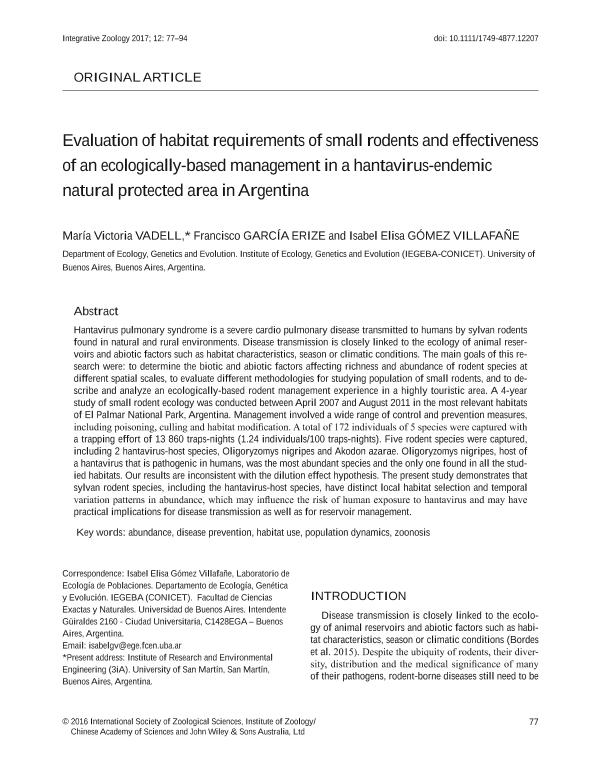Mostrar el registro sencillo del ítem
dc.contributor.author
Vadell, María Victoria

dc.contributor.author
GarcÍa Erize, Francisco
dc.contributor.author
Gomez Villafañe, Isabel Elisa

dc.date.available
2018-09-19T20:09:37Z
dc.date.issued
2017-01
dc.identifier.citation
Vadell, María Victoria; GarcÍa Erize, Francisco; Gomez Villafañe, Isabel Elisa; Evaluation of habitat requirements of small rodents and effectiveness of an ecologically-based management in a hantavirus-endemic natural protected area in Argentina; Wiley Blackwell Publishing, Inc; Integrative Zoology; 12; 1; 1-2017; 77-94
dc.identifier.issn
1749-4877
dc.identifier.uri
http://hdl.handle.net/11336/60357
dc.description.abstract
Hantavirus pulmonary syndrome is a severe cardio pulmonary disease transmitted to humans by sylvan rodents found in natural and rural environments. Disease transmission is closely linked to the ecology of animal reservoirs and abiotic factors such as habitat characteristics, season or climatic conditions. The main goals of this research were: to determine the biotic and abiotic factors affecting richness and abundance of rodent species at different spatial scales, to evaluate different methodologies for studying population of small rodents, and to describe and analyze an ecologically-based rodent management experience in a highly touristic area. A 4-year study of small rodent ecology was conducted between April 2007 and August 2011 in the most relevant habitats of El Palmar National Park, Argentina. Management involved a wide range of control and prevention measures, including poisoning, culling and habitat modification. A total of 172 individuals of 5 species were captured with a trapping effort of 13 860 traps-nights (1.24 individuals/100 traps-nights). Five rodent species were captured, including 2 hantavirus-host species, Oligoryzomys nigripes and Akodon azarae. Oligoryzomys nigripes, host of a hantavirus that is pathogenic in humans, was the most abundant species and the only one found in all the studied habitats. Our results are inconsistent with the dilution effect hypothesis. The present study demonstrates that sylvan rodent species, including the hantavirus-host species, have distinct local habitat selection and temporal variation patterns in abundance, which may influence the risk of human exposure to hantavirus and may have practical implications for disease transmission as well as for reservoir management.
dc.format
application/pdf
dc.language.iso
eng
dc.publisher
Wiley Blackwell Publishing, Inc

dc.rights
info:eu-repo/semantics/openAccess
dc.rights.uri
https://creativecommons.org/licenses/by-nc-sa/2.5/ar/
dc.subject
Abundance
dc.subject
Disease Prevention
dc.subject
Habitat Use
dc.subject
Population Dynamics
dc.subject
Zoonosis
dc.subject.classification
Otras Ciencias Biológicas

dc.subject.classification
Ciencias Biológicas

dc.subject.classification
CIENCIAS NATURALES Y EXACTAS

dc.title
Evaluation of habitat requirements of small rodents and effectiveness of an ecologically-based management in a hantavirus-endemic natural protected area in Argentina
dc.type
info:eu-repo/semantics/article
dc.type
info:ar-repo/semantics/artículo
dc.type
info:eu-repo/semantics/publishedVersion
dc.date.updated
2018-09-19T16:37:39Z
dc.journal.volume
12
dc.journal.number
1
dc.journal.pagination
77-94
dc.journal.pais
Reino Unido

dc.description.fil
Fil: Vadell, María Victoria. Consejo Nacional de Investigaciones Científicas y Técnicas. Oficina de Coordinación Administrativa Ciudad Universitaria. Instituto de Ecología, Genética y Evolución de Buenos Aires. Universidad de Buenos Aires. Facultad de Ciencias Exactas y Naturales. Instituto de Ecología, Genética y Evolución de Buenos Aires; Argentina
dc.description.fil
Fil: GarcÍa Erize, Francisco. Consejo Nacional de Investigaciones Científicas y Técnicas. Oficina de Coordinación Administrativa Ciudad Universitaria. Instituto de Ecología, Genética y Evolución de Buenos Aires. Universidad de Buenos Aires. Facultad de Ciencias Exactas y Naturales. Instituto de Ecología, Genética y Evolución de Buenos Aires; Argentina
dc.description.fil
Fil: Gomez Villafañe, Isabel Elisa. Consejo Nacional de Investigaciones Científicas y Técnicas. Oficina de Coordinación Administrativa Ciudad Universitaria. Instituto de Ecología, Genética y Evolución de Buenos Aires. Universidad de Buenos Aires. Facultad de Ciencias Exactas y Naturales. Instituto de Ecología, Genética y Evolución de Buenos Aires; Argentina
dc.journal.title
Integrative Zoology
dc.relation.alternativeid
info:eu-repo/semantics/altIdentifier/doi/http://dx.doi.org/10.1111/1749-4877.12207
dc.relation.alternativeid
info:eu-repo/semantics/altIdentifier/url/https://onlinelibrary.wiley.com/doi/full/10.1111/1749-4877.12207
Archivos asociados
